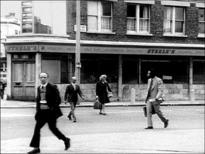1. THE MISE-EN-SCÈNE OF DIRECT ADDRESS I
SCREENING
The Girl Chewing Gum
John Smith
16 mm. | 00:12:00 | b&w
sound
In The Girl Chewing Gum an authoritarian voice seems to be negating the events in the image, not merely by giving orders to the people, the cars and the moving objects onscreen, but also by the actual camera movements. John Smith distances himself from the predominantly subtle use of voice-over in TV-documentaries, indicating how this practice guides and controls people. ‘Big Brother’ gives directions, shifting the identification of the spectator from the people in the image of the street towards the camera perspective.
Wednesday Afternoon
Simon Martin
video | 00:12:00 | col.
sound
An anonymous narrator reports on a tour of London museums. The narrator tries to capture the magic of wandering through a city, observing people and things without disrupting or changing the course of things, from a critical perspective but aloof from direct conclusions or resolutions. It’s a subjective enquiry into how people spend their time and the value attributed to that experience.
Appunti Per un’Orestiade Africana
Pier Paolo Pasolini
16 mm. | 00:65:00 | col. & b&w
sound
Pasolini’s ‘Notes for an African Oresteia’ is one of three films in his “poëma of the Third World”. This essayist project, which remained unfinished, should have been spread out over several episodes, situated in countries on their way towards heavy damage due to Western capitalism at the end of the 1960s. This film documents Pasolini’s quest for locations and actors in Kenya, Tanzania and Uganda, as part of an adaptation of the Greek tragedy by Aeschylus, the story of Orestes, which was never realised.
John Smith
16 mm. | 00:12:00 | b&w
sound
In The Girl Chewing Gum an authoritarian voice seems to be negating the events in the image, not merely by giving orders to the people, the cars and the moving objects onscreen, but also by the actual camera movements. John Smith distances himself from the predominantly subtle use of voice-over in TV-documentaries, indicating how this practice guides and controls people. ‘Big Brother’ gives directions, shifting the identification of the spectator from the people in the image of the street towards the camera perspective.
Wednesday Afternoon
Simon Martin
video | 00:12:00 | col.
sound
An anonymous narrator reports on a tour of London museums. The narrator tries to capture the magic of wandering through a city, observing people and things without disrupting or changing the course of things, from a critical perspective but aloof from direct conclusions or resolutions. It’s a subjective enquiry into how people spend their time and the value attributed to that experience.
Appunti Per un’Orestiade Africana
Pier Paolo Pasolini
16 mm. | 00:65:00 | col. & b&w
sound
Pasolini’s ‘Notes for an African Oresteia’ is one of three films in his “poëma of the Third World”. This essayist project, which remained unfinished, should have been spread out over several episodes, situated in countries on their way towards heavy damage due to Western capitalism at the end of the 1960s. This film documents Pasolini’s quest for locations and actors in Kenya, Tanzania and Uganda, as part of an adaptation of the Greek tragedy by Aeschylus, the story of Orestes, which was never realised.
This event is part of Tanya Leighton - In The Poem About Love You Don’t Write The Word Love

-
Fri 14.10.2005
20:15 - 21:45 -
Practical info
Location:
Filmmuseum
Ex Shell-Building
Ravensteinstr. 60
1000 Brussel - Artists